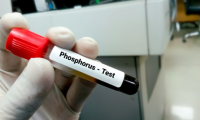-
Ardelyx Nabs FDA Approval for First Phosphate Absorption Blocker in CKD
- Source: drugdu
- 109
- October 20, 2023
-
FibroGen CEO Conterno, Who Scrapped Post-Lilly Plans Over Roxadustat Hype, Resigns After Launch Setbacks
- Source: drugdu
- 251
- July 27, 2023
-
Gilead’s COVID-19 Treatment Approved by FDA for Patients with Severe Renal Impairment
- Source: drugdu
- 118
- July 19, 2023
-
Clinical Trial Set to Change Kidney Transplant Practice
- Source: drugdu
- 113
- July 14, 2023
-
Kidney transplant recipients may benefit from new fluid therapy
- Source: drugdu
- 139
- July 8, 2023
-
AstraZeneca decries low kidney disease diagnosis rates, finds ‘urgent need’ for better screening
- Source: drugdu
- 172
- June 28, 2023
-
Novartis to acquire Chinook Therapeutics for approximately $3.5bn
- Source: drugdu
- 119
- June 16, 2023
-
Novartis to acquire Chinook Therapeutics for approximately $3.5bn
- Source: drugdu
- 108
- June 14, 2023
-
FDA OKs Injectafer for Iron Deficiency Anemia in Heart Failure
- Source: drugdu
- 135
- June 7, 2023
-
Pfizer’s Paxlovid approved by FDA and Gilead’s Veklury recommended by CHMP
- Source: drugdu
- 105
- May 30, 2023
your submission has already been received.
OK
Subscribe
Please enter a valid Email address!
Submit
The most relevant industry news & insight will be sent to you every two weeks.













